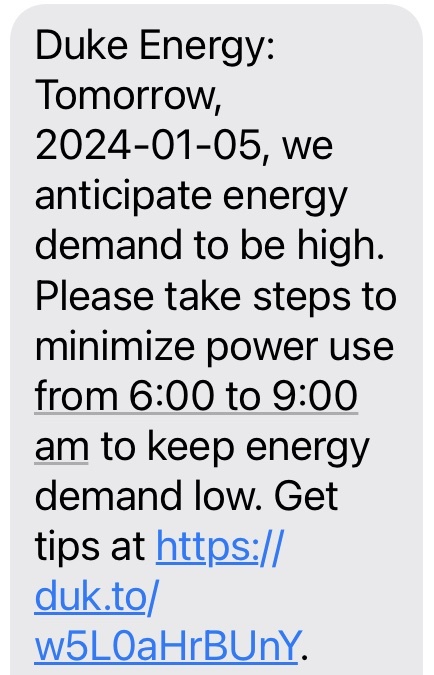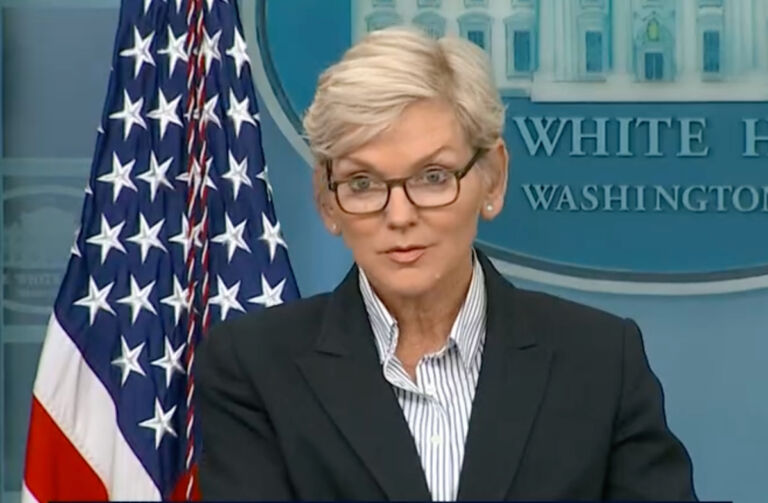Late afternoon on Thursday, January 4, customers of Duke Energy received a text message alerting them to expected high energy demand the next day and requesting they “take steps to minimize power use from 6:00 to 9:00 am to keep energy demand low.” Understandably, just over a year after the Duke’s first rolling blackouts in North Carolina, people were alarmed. Did it mean the power company was suggesting another round of blackouts was nigh?
What made it even more disconcerting is that the cold prompting the warning was not notably frigid. The forecast lows fell only to the upper 20s. That’s not unusual for a January low. The normal low temperature in January at Raleigh-Durham International airport is 30–31 degrees.

The timing of Duke’s requested action makes sense, at least. Peak energy demand in the winter is typically in the early morning just before sunrise. That’s when it’s coldest outside and when heat pumps are working hardest. It’s also when households start waking up, turning on lights, using appliances, taking hot showers, using hair dryers, etc., adding even more demand on the grid (to say nothing of large industrial operations). It will still be a few hours before solar power could contribute anything, assuming — of course — a sunny day.
WBTV asked Duke about the request and received the following reply saying it was part of an “education program”:
This is part of an educational program to help customers be aware of their energy use on days when there is higher than usual demand for electricity. The goal is to help them be as mindful as possible of their energy usage on cold days.
There is no imminent threat to the grid but we will be doing our part during cold weather to help manage energy across the grid, and hope our customers will also engage with us to do the same.
WRAL also contacted Duke about the message. Duke was apologetic about the text causing customers to fear another round of blackouts:
WRAL spoke with Duke Energy’s spokesperson, Jeff Brooks, who says yesterday’s message was just telling customers about higher energy demand. More people will be using energy today — especially between 6 and 9 a.m. this morning. If you can save energy, great— but as far as blackout, Brooks says customers shouldn’t worry.
In an official statement, Duke Energy clarified, “The purpose is to inform customers about an expected surge in demand. We are taking measures to safeguard the grid’s reliability, and this serves as an opportunity for customers to be mindful that this time frame experiences peak usage. Any assistance from customers during this period is greatly appreciated.”
“Sorry for any confusion that the wording of that notification caused. We do not have any concerns about reliability tomorrow at this point. We are going to evaluate the wording used to improve any future cold-weather energy saving communications to customers,” said Jeff Brooks, Duke Energy grid specialist, on X [formerly Twitter].
Reliability and affordability, not politics
A chance to help people be mindful of energy use during times of high demand may be prudent. Nevertheless, it’s hard not to wonder that North Carolina’s energy grid is frailer than it used to be. Politics has been very intrusive in power delivery in recent years under the Cooper administration, whose “Clean Energy Plan” was shaped by zealots who admittedly had very little interest in the two obvious great needs in providing power to people: affordability and reliability.
The General Assembly wisely put those guardrails back, but it is incumbent upon the North Carolina Utilities Commission and Duke to uphold affordability and reliability in the future.
For more discussion on the reliability and costs of North Carolina’s different electricity generating sources, see the following:


